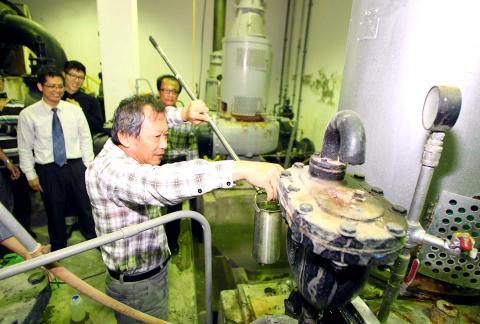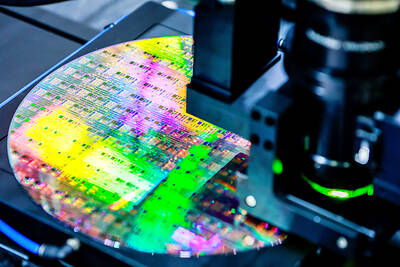Advanced Semiconductor Engineering Inc (ASE, 日月光半導體) yesterday said it had not fabricated wastewater test results and had not installed any covered sewer systems to discharge untreated wastewater into the ocean.
The remarks came after three managers with the Greater Kao-hsiung-based company were brought in for questioning by authorities yesterday as calls for tougher sanctions against the company continued to grow louder.
Su Ping-shou (蘇炳碩), director of ASE’s K7 plant, from which untreated industrial wastewater was found to have been discharged, was detained by prosecutors yesterday, while one official was released on bail of NT$1 million (US$33,800) after questioning.

Photo: CNA
Meanwhile, a prosecutor and officials with the Greater Kaohsiung’s Environmental Protection Bureau yesterday found pipelines under the K7 site that may have been used to discharge the wastewater.
An environmental inspector said the discovery added to the possibility that the plant bypassed authorized discharge pipes altogether.
The K7 plant’s management has already been accused of falsifying discharge data related to pH value, chemical oxygen demand and suspended solids in an attempt to evade punishment.
The city’s environmental agency has said the plant also attempted to deceive officials by running tap water into its wastewater storage pool before samples were to be taken for regular testing.
ASE, the world’s biggest chip packager, said in a statement that the pH value of 4.14 found in its own tests at the K7 plant, was in accordance with the regulated figure, so it did not have to fake the number.
The value was different from the 2.84 tested by the local environment protection agency, which ASE said was because the firm conducted its tests on Oct. 1 at a different time from when the toxic wastewater leaked out, the statement said.
ASE spokesman Richard Chang (張洪本) also said in the statement that the company did not conceal any illegal behavior, as the pipelines at another factory, K11, in Greater Kaohsiung, were not designed to release wastewater directly into the sea before treatment, as officials from the environment protection agency had said.
Greater Kaohsiung officials, who examined ASE’s wastewater treatment sewage system yesterday, said they suspected that ASE has been illegally discharging untreated wastewater via the concealed pipes as the pipes are not shown in the K11 factory layout.
“We have obtained approval for the use of the wastewater system that is pumped out into the sea,” Chang said.
“The pipes [found by the environmental officials] are only connected to a bigger wastewater system, rather than directly dumped into the ocean,” he added.
In the legislature yesterday, lawmakers across party lines called for stiffer penalties on companies that break the law.
Under the Water Pollution Control Act (水污染防治法), a company can be fined between NT$60,000 and NT$600,000 for an offense and ordered to rectify the problem before a specified deadline or face multiple fines or a shutdown of its operations.

TECH TITAN: Pandemic-era demand for semiconductors turbocharged the nation’s GDP per capita to surpass South Korea’s, but it still remains half that of Singapore Taiwan is set to surpass South Korea this year in terms of wealth for the first time in more than two decades, marking a shift in Asia’s economic ranks made possible by the ascent of Taiwan Semiconductor Manufacturing Co (TSMC, 台積電). According to the latest forecasts released on Thursday by the central bank, Taiwan’s GDP is expected to expand 4.55 percent this year, a further upward revision from the 4.45 percent estimate made by the statistics bureau last month. The growth trajectory puts Taiwan on track to exceed South Korea’s GDP per capita — a key measure of living standards — a

Samsung Electronics Co shares jumped 4.47 percent yesterday after reports it has won approval from Nvidia Corp for the use of advanced high-bandwidth memory (HBM) chips, which marks a breakthrough for the South Korean technology leader. The stock closed at 83,500 won in Seoul, the highest since July 31 last year. Yesterday’s gain comes after local media, including the Korea Economic Daily, reported that Samsung’s 12-layer HBM3E product recently passed Nvidia’s qualification tests. That clears the components for use in the artificial intelligence (AI) accelerators essential to the training of AI models from ChatGPT to DeepSeek (深度求索), and finally allows Samsung

Taiwan has imposed restrictions on the export of chips to South Africa over national security concerns, taking the unusual step of using its dominance of chip markets to pressure a country that is closely allied with China. Taiwan requires preapproval for the bulk of chips sold to the African nation, the International Trade Administration said in a statement. The decision emerged after Pretoria tried to downgrade Taipei’s representative office and force its move to Johannesburg from Pretoria, the Ministry of Foreign Affairs has said. The move reflects Taiwan’s economic clout and a growing frustration with getting sidelined by Beijing in the diplomatic community. Taiwan

READY TO HELP: Should TSMC require assistance, the government would fully cooperate in helping to speed up the establishment of the Chiayi plant, an official said Taiwan Semiconductor Manufacturing Co (TSMC, 台積電) yesterday said its investment plans in Taiwan are “unchanged” amid speculation that the chipmaker might have suspended construction work on its second chip packaging plant in Chiayi County and plans to move equipment arranged for the plant to the US. The Chinese-language Economic Daily News reported earlier yesterday that TSMC had halted the construction of the chip packaging plant, which was scheduled to be completed next year and begin mass production in 2028. TSMC did not directly address whether construction of the plant had halted, but said its investment plans in Taiwan remain “unchanged.” The chipmaker started